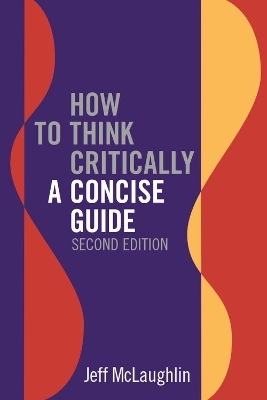
How to Think Critically
Broadview Press Ltd (Verlag)
978-1-55481-533-3 (ISBN)
How to Think Critically begins with the premise that we are all, every day, engaged in critical thinking. But just as we may develop bad habits in daily life if we don't scrutinize our practices, so we are apt to develop bad habits in critical thinking if we are careless in our reasoning. Readers are presented with a traditional step-by-step method for analysis that can be applied to all argument forms. Hundreds of exercises (with solutions) are included, as are several random statement generators which can be used to create thousands of additional examples. Venn diagrams, truth tables, and other essential concepts are presented not as definitions for academic study but as tools for better thinking and living. This second edition is substantially revised and improved throughout, and includes an all-new chapter on the applications of critical thinking in online contexts.
Jeff McLaughlin is Professor of Philosophy at Thompson Rivers University.
Chapter 1: Identifying Arguments and Non-Arguments
1.1 Arguments, Not Fight
1.2 Critical Thinking and Reasoning
1.3 Arguments vs. Unsupported Claims
1.4 Premises and Conclusions: The Building Blocks of Arguments
1.5 Identifying Statements and Arguments
Statement Generator: Moral Issues Statements
Chapter 2: The Use and Abuse of Language
2.1 Meaning, Denotation, and Connotation
2.2 Defining Words
2.3 Vagueness and Ambiguity
2.4 Emotional Language & Prejudicial Language
2.5 Scope and Conviction
Chapter 3: Argument Structure and Assessment
3.1 Standardizing Arguments
3.2 Editing Arguments
3.3 Complex Arguments
Chapter 4: Argument Evaluation
4.1 The S-Test
4.2 Step 1: Satisfactory Premises
4.3 Step 2: Supporting Premises
4.4 Step 3: Sufficient Support
4.5 Passing the S-Test
4.6 Failing the S-Test
Statement Generator: Moral Issues
Statement Generator: Business Issues
Chapter 5: Argument Types
5.1 Deductive Arguments
5.2 Inductive Arguments
5.3 Arguments from Analogy
Chapter 6: Fallacies
6.1 List of Fallacies
6.2 Fallacies in Advertising
Chapter 7: Categorical Logic
7.1 Categorical Logic and Categorical Statements
7.2 The Square of Opposition
7.3 Rules of Inference
7.4 Depicting Categorical Statements Using Venn Diagrams
7.5 Depicting Categorical Syllogisms Using Venn Diagrams
7.6 Using Rules to Evaluate Categorical Syllogisms
7.7 Missing/Implicit Statements in Categorical Syllogisms
Chapter 8: Propositional Logic Using Truth Tables
8.1 Translating Propositions
8.2 Basic Truth Tables for And, Or, Not, and If, Then
8.3 Creating Long Truth Tables
8.4 Creating Short Truth Tables
Chapter 9: Critical Thinking Online
9.1 Tools and Tips
9.2 Developing Safe Search Habits
9.3 How (not to) Argue Online
Glossary of Key Terms
| Erscheinungsdatum | 02.09.2023 |
|---|---|
| Verlagsort | Peterborough |
| Sprache | englisch |
| Maße | 152 x 229 mm |
| Gewicht | 450 g |
| Themenwelt | Geisteswissenschaften ► Philosophie ► Logik |
| ISBN-10 | 1-55481-533-9 / 1554815339 |
| ISBN-13 | 978-1-55481-533-3 / 9781554815333 |
| Zustand | Neuware |
| Haben Sie eine Frage zum Produkt? |
aus dem Bereich


